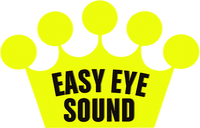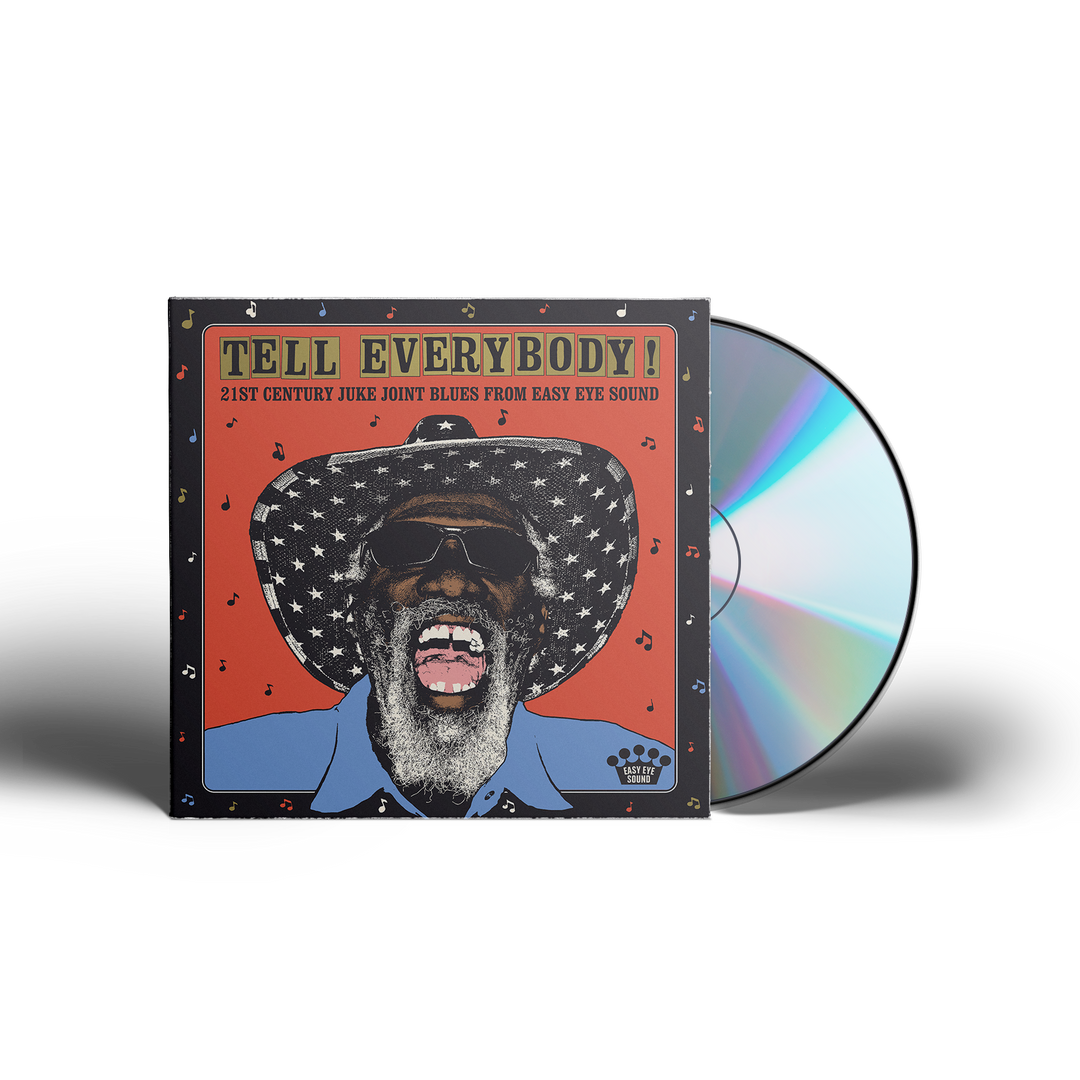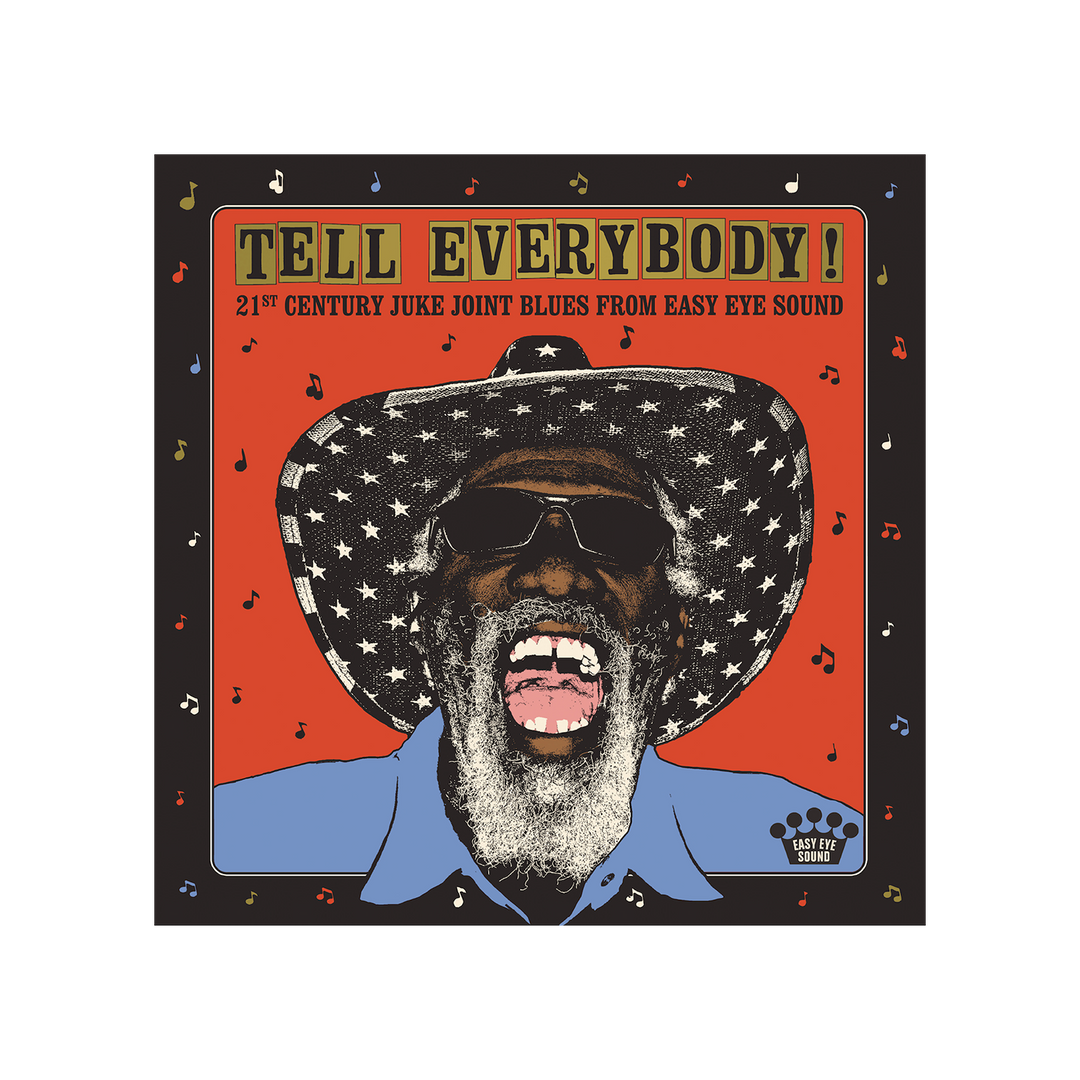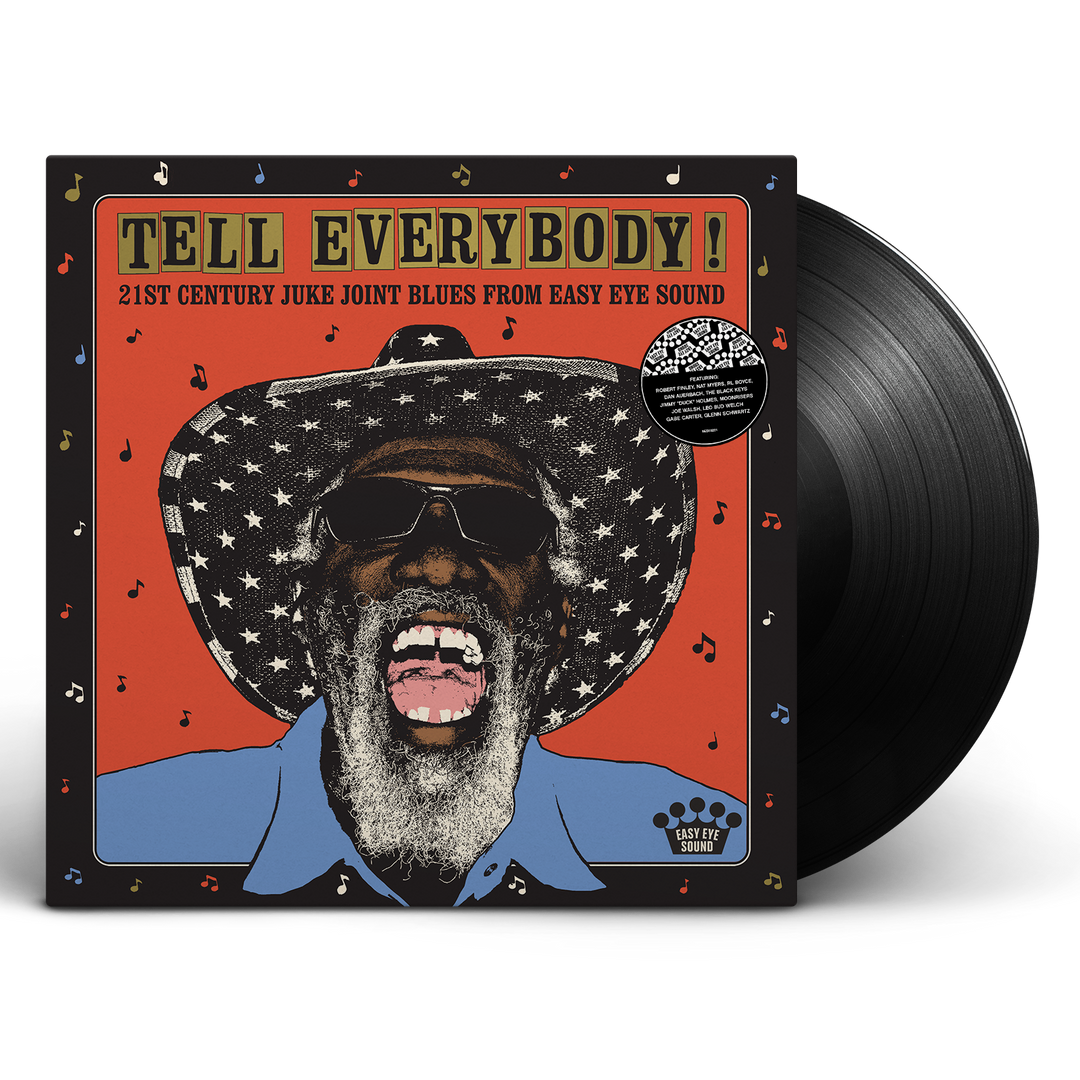The blues is a river with tributaries that flow into virtually every channel of American music.
Dan Auerbach’s Nashville-based label Easy Eye Sound — Billboard’s Blues Label of the Year in 2022 — is charting a new course in “21st century juke joint blues.” The label’s new anthology Tell Everybody! is a bracing compilation, produced by Auerbach — winner of the GRAMMY Award as 2013 Producer of the Year, Non-Classical — featuring all new, exclusive recordings cut at Easy Eye Sound’s eponymous Nashville studio. From old masters to brilliant youngbloods, acoustic blues to roiling blues-rock, the collection is a fully realized survey of the blues tradition.
The collection opens with GRAMMY nominated singer-guitarist R.L. Boyce’s “Coal Black Mattie.” Before stepping out as a soloist, Boyce was a member of North Mississippi legend Othar Turner’s Rising Star Fife and Drum Band, which maintained the pre-blues sound of Black marching bands.
Auerbach points to the stormy recordings of such Boyce contemporaries as North Mississippi singer-guitarists like R.L. Burnside (who included “Coal Black Mattie” in his repertoire for decades) and Junior Kimbrough for inspiring his early interest in the blues: “They made the lightbulbs go off in my brain at that age.”
The high-powered Louisiana singer-songwriter-guitarist Robert Finley — who has released two albums on Easy Eye Sound, Goin’ Platinum (2017) and Sharecropper’s Son (2021) — is featured on the collection’s cover and authored the collection’s title number and lead-off track, a surging welcome to the blues party alongside Mississippi blues legends Kenny Brown (guitar) and Eric Deaton (bass), who play on Finley’s track and several others across the collection.
Auerbach says of the high-spirited 69-year-old musician, “Robert’s like a mega-superstar, and the world doesn’t know it yet. I had him come in to do some vocals on this little project I had, and I thought it was a good way to meet each other and make some music together with no pressure. He walked in wearing a three-quarter-length leather duster, a giant belt buckle, snakeskin boots, a leather cowboy hat, and a silk western shirt with pearl snaps. We just hit it off, and I invited him back to record. He’s larger than life, and his vocal range is crazy, limitless. He’s endlessly creative, and he’s so much fun to write with. I brought him on tour with me, and he got a standing ovation at every show. He got three standing ovations at the Ryman Auditorium when we played there. He’s so magnetic.”
Another awe-inspiring figure featured on Tell Everybody! is the late Ohio singer-guitarist Glenn Schwartz. A much-beloved product of Cleveland, Schwartz was the lead guitarist for the James Gang before Joe Walsh established his career with the trio. In the ’70s he joined the L.A. blues-rock unit Pacific Gas & Electric. After experiencing a conversion to Christianity, he wrote for and played in the evangelical rock group the All Saved Freak Band.
Schwartz was another formative figure for Auerbach.
“The first time I saw Glenn, I was a teenager,” he recalls. “He was playing in this little bar in Cleveland down by the river, in an industrial part of town, a real blue-collar bar, called Hoople’s. He had a three-piece — a drummer, and his brother Gene on bass. He had two Fender Quad Reverb amps, which are eight 12-inch speakers, and this was in a tiny bar. I’d never seen anybody play that loud, and I’d never heard somebody playing something that I could hear was like blues music, but was also playing original songs. He was playing a homemade 10-string guitar. It sounded crazy, it sounded like Cream — these hectic, chaotic blues, super-heavy songs. It was probably the inspiration for starting The Black Keys, a huge inspiration.
“Down the road, when I met Joe Walsh, he told me that he basically had the same experience. He went to see him in the late ’60s, I think in Bowling Green, at a college party or a bar downtown, and Joe said he had on purple velvet bell-bottoms, no shirt, and he was playing guitar behind his back while sitting on his buddy’s shoulders while he was walking out of the building. And he said it made him want to play rock ’n’ roll. It was funny that we’d both had the same experience with the same person.”
In 2016, Schwartz (who had returned to playing secular music) recorded a session at Easy Eye Sound with Auerbach, the members of his group The Arcs, and Walsh. Two tracks from this unreleased date appear on Tell Everybody!: a new version of the All Saved Freak Band’s gospel blues “Daughter Of Zion,” with Walsh, and an acoustic Schwartz original, “Collinwood Fire,” which commemorates the tragic Lake View School fire of 1908 that killed 172 Cleveland schoolchildren. Schwartz died in 2018, two years after he appeared with Auerbach, Walsh, and The Arcs at the 2016 Coachella Valley Music and Arts Festival.
Two blues elders on the Easy Eye Sound roster are heard in previously unissued mono versions of their songs. Jimmy “Duck” Holmes’ “Catfish Blues” — originally recorded in 1941 by Robert Petway and later popularized by Muddy Waters — was heard on the Bentonia, Mississippi, singer’s 2019 Easy Eye Sound bow Cypress Grove, which was nominated for a GRAMMY Award as Best Traditional Blues Album. The late gospel blues master Leo “Bud” Welch’s “Don’t Let The Devil Ride” was featured on The Angels In Heaven Done Signed My Name, which the label released after the singer-guitarist’s death in 2017 at the age of 85.
Auerbach says of the recordings, “I really like ’em in mono. I have a bunch of records in both stereo and mono versions. There’s just something special about mono when it works, and those two in mono work really, really nice. The mixes are different, too.”
The new generation of blues performers are represented on Tell Everybody! by the Detroit duo Moonrisers (drummer Adam Schreiber and Dobro player Libby DeCamp); Chicago-based Gabe Carter; and the Korean-American Kentucky native Nat Myers.
The Moonrisers’ “Tall Shadow” was recorded during the pair’s stay in Nashville for an appearance at the 2022 Easy Eye Sound Fish Fry during AmericanaFest. “They were down at the studio, playing a little bit,” Auerbach says, “and they played this instrumental. I just loved the way they played together, it knocked me out. I loved their dynamic together. It reminded me of the guitarists Sandy Bull and John Fahey.”
Carter and Myers both play in the so-called “Bentonia style” of the late Mississippi titans Skip James and Jack Owens.
“Aaron Frazer of Durand Jones & the Indications, whose solo album we released, told me about Gabe Carter,” Auerbach says. “He showed me a video of Gabe playing on the street with an electric guitar, singing through the amp, with just a drummer, and I loved it. I invited him up to the studio, and we recorded and did a little writing together.”
“I stumbled across Nat Myers online and instantly reached out to him. He came down to Nashville from Kentucky, which is where he lives. We started writing right away. It was so much fun to meet somebody else who was so into that type of music but is also interested in creating new songs, new work. It’s hard to find those people — they’re few and far between. Writing a bunch of songs and playing this music we love was a real blessing.”
The collection is rounded out by two exclusive, never-before-heard tracks: Dan Auerbach’s solo recording “Every Chance I Get (I Want You In The Flesh)” and “No Lovin,” the all new single from The Black Keys — who received a GRAMMY nomination in 2022 for their record, Delta Kream. Moving in something of a full circle, the insistent instrumental drone on Auerbach’s solo track will immediately remind some listeners of Canned Heat’s 1967 recording “On the Road Again” — “I loved that song as a kid,” says Auerbach — which itself borrowed from Chicago bluesman Floyd Jones’ “Dark Road” (1953) and its inspiration, Mississippi Delta deity Tommy Johnson’s “Big Road Blues” (1928).
That river, the blues, flows on.






